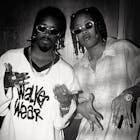
Hip-Hop Label 101: Ruffhouse Records
Hip-Hop Label 101: Ruffhouse Records
Published Fri, May 7, 2021 at 11:46 AM EDT
Ruffhouse Records had some of the biggest-selling rap acts of the 1990s.
But so often, the label doesn't get mentioned alongside other powerhouses of that decade. The Philadelphia-based label became a somewhat unlikely Hip-Hop force at a time when labels like Bad Boy and Death Row were dominating mainstream Hip-Hop. But there was also the chart-topping success of Ruffhouse, pushing rap music onto the pop charts. Acts like Cypress Hill, Kris Kross and The Fugees put the company at the forefront of Hip-Hop's mainstreaming.
With recording engineer/business partner Joe Nicolo, Chris Schwartz turned Ruffhouse into a Hip-Hop hit factory during the 1990s.
Ruffhouse co-founder Chris Schwartz first made a name in Philadelphia managing Schoolly D. It was Schwartz who was handling the Hip-Hop star's career when D broke through big with "P.S.K. (What Does It Mean?)" in 1985. He was a kid who'd grown up in Devon, in the Main Line suburbs of Philadelphia, the seventh of 10 kids in a working class family. His older brothers routinely beat him up and once he turned 18, he decided to enlist in the Navy to escape his home life.
But he'd honed a love of music since his childhood; growing up on the album-oriented rock of acts like Frank Zappa and also jazz fusion. Dabbling in guitar, Schwartz played in a few Navy bands and formed an electronic-music group called Tangent with his friend Jeff Coulter once he returned to Philadelphia. As they played Philly venues like the East Side Club, Revival, and the Empire Rock Club, Schwartz became known behind the scenes He worked at Virtue Recordings at Broad and Cecil B. Moore, alongside the legendary music vet Frank Virtue.
But it was meeting Schoolly D that forever altered Schwartz's life. It was through D that Schwartz was plugged into the Hip-Hop scene. After Schwartz's band was rejected by a indie record distributor, he decided to focus his energy elsewhere. That distributor was impressed by some of the work he'd produced with this guy Schoolly D on the side.
"I was like, 'Okay well, I'm not the artist, but I’m the producer. This is something,'" Schwartz said to Forbes in 2019. "Luckily, it turned out to be fortuitous for certain people who were of obvious talent [and] should have been heard. My misfortune was their gain, and it was all for the better good."
That "better good" was the founding of Ruffhouse Records.
He and Nicolo launched the label officially in 1987, inking a distribution deal with Columbia Records. At the dawn of the 1990s, Ruffhouse made a name signing rap acts that stood out, but also sold records. The first major drop in the bucket was Chicano rap stars Cypress Hill.
"What made Cypress Hill really unique," Schwartz explained, "was when people heard them for the first time. They thought there were four rappers in the group because of all the different voices and everything. There was nothing like it."
Cypress Hill's debut was a platinum-seller in 1991, with singles like "How I Could Just Kill A Man" and "Phunky Feel One" establishing both the group and the label as power players. And it was Ruffhouse that took a chance on two pre-teen rappers and their teenaged producer.
"Kris Kross had a demo called "Lil' Boys in Da Hood,"" said Schwartz in 2019. “It was them talking about, 'I’m 11 years old. My role model is this guy driving a Range Rover who has nice clothes, pretty girls, cash. He's like a gangster, drug dealer.' This is about those choices made when you're 11-12 years old. What happened was, towards the end of the record, they had done "Jump" the single, and my whole hip-hop record by some introspective 11-year-olds went out the window. It became something else."
The success of "Jump" was a phenomenon and made Kris Kross the biggest act on Ruffhouse. But because the duo was produced by Jermaine Dupri, who would launch his own So So Def imprint in 1993, they were more visibly affiliated with Dupri's label. It didn't really matter of Ruffhouse didn't have the same kind of branding that many of their contemporary companies had; Ruffhouse had the platinum plaques.
“I think [Ruffhouse’s] aesthetic was unsurpassed,” Shwartz said in 2019. “Joe and I were very song-oriented guys." The ethos at Ruffhouse was artist-driven, and the label didn't bother with trying to craft a signature sound. Ruffhouse specialized in artists who didn’t need a cadre of superproducers or an overarching label image to forge an identity.
"That was the thing with Joey and I," Schwartz said. "We were always looking for musicality.”
By the mid-1990s, Ruffhouse was rolling. A young Questlove of the Roots would work at Ruffhouse as an intern, and a New Jersey-based trio found their way onto the label. The Fugees didn't explode early on, (their debut album Blunted On Reality, was coolly received), but when the trio of Wyclef, Lauryn Hill and Pras re-emerged with their 1996 sophomore album The Score, they became the biggest success the label would see.
"We were their last shot,” said Schwartz in 2019. "Before they even finished the first song, I already decided to sign them 30 -45 seconds into [the audition]. Wyclef had a huge beatbox radio and an acoustic guitar. He played like a hip-hop loop with acoustic guitar accompanied by the vocal singing and rapping. There had never been anything like that, that’s all I needed."
DROP YOUR EMAIL
TO STAY IN THE KNOW
The Score went to No. 1 on the Billboard album chart and eventually sold six million copies in the U.S.
Of course, there would be no follow-up from The Fugees, as the group acrimoniously split in 1997, at the height of its popularity. But the split spawned two very successful solo albums for Ruffhouse: Wyclef Jean's 1997 debut The Carnival, and the Grammy Award-winning solo debut The Miseducation Of Lauryn Hill. In 2019, Schwartz revealed that he was discouraged from releasing Hill's album by Columbia execs, who thought the songs were "mediocre."
"When you have two guys who have been collectively been in the business for 50-60 years, and they're telling you this, it's hard to not have some doubt," Schwartz told Forbes. "I felt bad about it because I always had confidence in her and her abilities. But then I thought about the Wyclef record [1997’s The Carnival], and how they didn’t initially like that record. I'm like, ‘Why should I be listening? Maybe I should just keep on doing what I'm doing.'"
Ruffhouse would have its share of misses, no doubt. The label famously landed the first single from "Nasty" Nas, the song "Halftime" that would appear on the soundtrack of the 1992 movie Zebrahead, but lost the rapper after Schwartz overhyped the Queens artists' upcoming debut album, Illmatic. The parent label, Columbia, basically "took" Nas back, and the rest is history.
Ruffhouse's 90s run way slowed in the early 00s, and Schwartz had his own personal battles.
“I went through years of drug addiction,” Schwartz told The Philadelphia Inquirer in 2019. “I had so many opportunities to address this, but I was a coward. Why is it so hard to convince junkies who run million-dollar businesses that they have a problem? Because they run million-dollar businesses.”
The label shuttered in 1999, but was revived over a decade later as RuffNation. Schwartz and Ruffhouse carved a unique legacy, one built on individuality. And at a time when Hip-Hop's epicenters were industry powerhouses in New York and Los Angeles, this little Philly label made more than a little noise.






